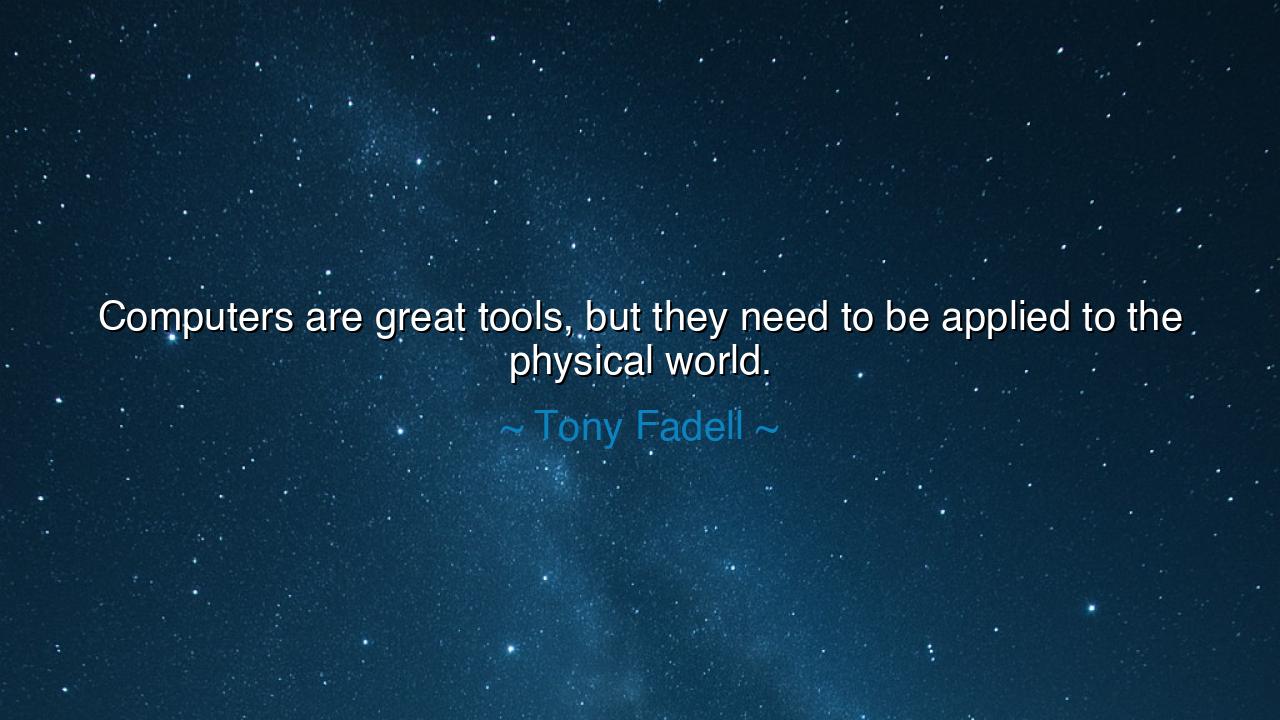
Computers are great tools, but they need to be applied to the






“Computers are great tools, but they need to be applied to the physical world.” — Tony Fadell
Hear now the words of Tony Fadell, an inventor of our time, a builder of things both digital and tangible. His saying is simple on its surface, yet profound in its depth: “Computers are great tools, but they need to be applied to the physical world.” In these few words lies a truth that bridges the ancient and the modern—the truth that knowledge, no matter how vast, is meaningless unless it shapes the world we live in. He speaks as one who has crafted not merely code, but devices that breathe in the realm of touch and form, reminding us that thought must always find embodiment, and vision must descend from the realm of ideas into the realm of action.
For though computers now hum with the wisdom of generations, though they simulate the cosmos and speak in languages of logic, they remain servants of the human will. Fadell’s words are a warning against the danger of abstraction—the temptation to dwell forever in the digital ether, forgetting the soil beneath our feet. The ancients once gazed at the stars and wrote down their patterns, not to escape the earth, but to plant and harvest more wisely. Likewise, the machines of our age, however intelligent, exist not to replace the world, but to illuminate and improve it. The farmer, the architect, the healer, the builder—these are still the hands that give purpose to our inventions.
Fadell himself, as the maker of the iPod and the Nest thermostat, learned this truth through creation. He did not merely design circuits or write code—he gave shape to tools that changed how people live, listen, and dwell. The computer was his instrument, but the world was his canvas. He understood that the power of technology lies not in the screen, but in the way it connects to life—the music in the ear, the warmth in the home, the ease of daily existence. His insight, therefore, is not technological, but spiritual: machines serve their highest purpose only when they return to the human realm, when they make life more vivid, more humane, more whole.
In the time of Leonardo da Vinci, this lesson was already written in the language of invention. Leonardo, who dreamed of flying machines and mechanical wonders, did not imagine art and science as separate domains. To him, knowledge that did not touch the world was hollow. His sketches of wings and gears were not mere fantasies; they were efforts to bring thought into motion, to turn idea into flight. Fadell’s wisdom follows that same lineage: that the power of mind—whether expressed through pen, brush, or code—must be made flesh through the hands of the maker.
Yet there is a quiet warning in his words. The world today is filled with those who worship the digital and forget the physical—who live through screens, detached from the pulse of reality. They measure their worth in clicks and data, while the earth itself grows neglected. Fadell calls us back to balance—to remember that life is not lived in code but in breath, in warmth, in the presence of other souls. The computer is a mighty tool, but only when guided by the needs of the living. To use it well is to marry precision with compassion, innovation with stewardship.
Therefore, let this be a lesson for all creators: Do not let your brilliance dwell only in the abstract. Whatever you build—whether in art, science, or technology—let it serve the world of touch and need. A program that helps the farmer sow, a design that heals the sick, an invention that eases the burdens of daily life—these are the true fruits of knowledge. The goal of intellect is not escape, but engagement. To shape reality with care, to leave the world better than we found it—that is the sacred duty of every maker.
So, my children of the wired age, remember the wisdom of Fadell: let your machines be faithful servants, not distant gods. Use them to build bridges, to create warmth, to heal and connect. Let every idea descend from the cloud into the earth. For though the mind may dwell in data, the heart beats in flesh. And only when the two are joined—when the light of reason meets the soil of reality—will humanity truly fulfill its destiny: not as the prisoner of its inventions, but as their master, shaping both technology and life with equal wonder and wisdom.






AAdministratorAdministrator
Welcome, honored guests. Please leave a comment, we will respond soon